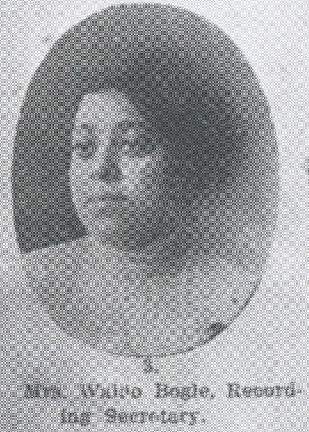Biographical Database of Black Woman Suffragists
Biography of Bonnie Thomas Bogle, 1884-?
By Thomas Dublin, Distinguished Professor Emeritus, SUNY Binghamton
Bonnie Thomas was born in October 1884 to Edward and Mary Thomas in Texas. She was the fourth child and first daughter in the family. By 1900 she was living in Portland in a household with three cousins, still attending school. After completing two years of college, she married Waldo Bogle in 1903. They had one child, Richard, born in Washington state in 1904. The 1910 census found the young family living in Walla Walla, WA. Waldo worked as a barber; Bonnie was listed as a housewife, but also a wage earner; Richard, 6, could read and write, but did not attend school. At some date in 1910 or 1911, the family moved to Portland. By 1920 Bonnie's widowed mother was living with Waldo and Bonnie in Portland. City directories place Bonnie and Waldo in Portland still in 1938. Waldo worked as a barber in 1920 and 1930; Bonnie worked as an editor for the Northwest Enterprise, a black weekly newspaper published in Seattle, which had a satellite of fice in Portland. She also advertised her services as a piano teacher in Portland in 1924. The couple was divorced at some point in the 1930s and Bonnie Bogle appeared in the Federal manuscript census of Gearhart, OR in 1940 as a housekeeper in a hotel near Astoria, OR. How long she wrote for the Northwest Enterprise is unclear.
Bonnie Bogle's first evident political activity came in early 1912, at the start of Oregon's fourth suffrage campaign since 1906. The three previous campaigns had been defeated and Oregon‘s woman suffrage movement was sharply divided by the imperious leadership in these years of Abigail Scott Duniway. Votes for woman suffrage declined across the three failed campaigns from 44 percent to 37 percent. In 1912, illness kept Duniway in the background and a diverse coalition of groups came together in support of woman suffrage, including the state's farmers' organization, the Grange. One historian has counted 23 suffrage organizations in the Portland area in 1912 and another 8 "endorsing organizations." These included a Men's Equal Suffrage Club and the Portland Woman's Club, both endorsing woman suffrage. A broad coalition of groups emerged to back the campaign including Chinese American and black suffragists. Out of staters joined the campaign as the absence of Duniway from active leadership encouraged NAWSA activists to lend their support. NAWSA president Anna Howard Shaw made an appearance in September. In the November vote, fully 52 percent supported woman suffrage, an increase of 15 percent over the 1910 tally.
Bogle joined other black activists in September 1912 at a public meeting at Mt. Olivet Baptist Church in Portland, sponsored by the Colored Women's Equal Suffrage Club. The club had been organized for two months and had 14 members. Newspaper coverage described the club as an "outgrowth of the Colored Women's Council," in which Bonnie Bogle was serving as secretary. The Council had forty members and met "twice a month at the three colored churches of the city in rotation." In May 1916 she was re-elected as Corresponding Secretary, while her mother was treasurer. In May 1920 she served on the arrangements committee of the Colored Women's Club of the A.M.E. church. Her editorial work began at some point in the 1920s with the Seattle-based Northwest Enterprise, and by 1930 she was contributing a regular column, the "Portland News Section," with news of Portland's black community. Between 1924 and 1928, she contributed to a monthly series in The Messenger, the official newspaper of the Brotherhood of Sleeping Car Porters, edited by A. Phillip Randolph. The series, entitled "Negro Womanhood's Greatest Needs," was a symposium by leading "Negro clubwomen of the United States." Bonnie Bogle was one of those clubwomen.
Bonnie Thomas Bogle's profile reflects that of numerous black women suffragists in the 1900-1920 period. Born in the South, her activism took of f after migration to a northern city. In the north like other activists she lived, worshipped and worked politically within family networks that moved north with her. In the urban north these families found economic opportunity and political independence that would have been impossible in the Jim Crow South of these decades. In Portland Mary Thomas and Bonnie Bogle joined Eliza West, Katherine Gray, and Edith Gray as two such multi-generational groupings that worked for racial uplift and woman suffrage.

Bonnie Bogle, 1913, from "Officers of the Colored Women's Council,"
In The Advocate, 20 December 1913, p. 4, in Rutherford Collection, Special Collections, Portland State University Library.
Sources:
Kimberly Jensen, "'Neither Head nor Tail to the Campaign": Esther Pohl Lovejoy and the Oregon Woman Suffrage Victory in 1912," Oregon Historical Quarterly, 108:3 (2007), 350-83.
Sophia Wellons, "Oregon's Colored Women's Equal Suffrage League and the 1912 Campaign," accessed online at http://centuryofaction.org/index.php/main_site/document_project/oregons_colored_womens_equal_suffrage_league_and_the_1912_campaign
"Oregon Woman Suffrage History Month to Month," accessed online at http://centuryofaction.org/index.php/main_site/This_month
Federal Manuscript Censuses, Portland, OR, 1900-1930; Gearhart, OR, 1940. Accessed via HeritageQuest.com.
Portland City Directory listings for Waldo Bogle and Bonnie Bogle, Portland, OR, accessed via Ancestry Library Edition.
"Colored Suffragists Act," The Morning Oregonian, Sept. 17, 1912, p. 12.
"Colored Women of City Perform Good Service for Needy," Oregon Daily Journal, May 2, 1916, p. 7.
"Colored Women's Club," Oregon Daily Journal, May 20, 1920, p. 13.
Laila Haidarali, Brown Beauty: Color, Sex and Race from the Harlem Renaissance to World War II (New York: New York University Press, 2018), p. ?.
Kimberley Mangun, A Force for Change: Beatrice Morrow Cannady and the Struggle for Civil Rights in Oregon, 1912-1936 (Corvallis: Oregon State University Press, 2010), p. 30.
Kelly Connors, "The Northwest Enterprise: Social and Racial Equality in 1938," The Seattle Civil Rights & Labor History Project, accessed online at https://depts.washington.edu/civilr/news_NWEnterprise1938.htm.
Related Writings in Database
